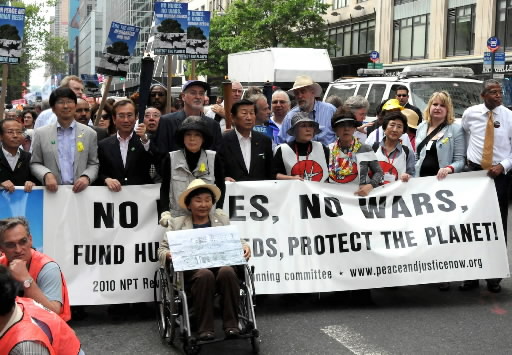Editorial: Make the NPT Review Conference a first step to bidding farewell to nuclear weapons
May 6, 2010
by Noritaka Egusa, Editor/Senior Staff Writer
The Nuclear Non-proliferation Treaty (NPT) Review Conference has opened. The success of the four-week deliberations at this conference, held every five years, will be judged in terms of whether humanity can make this gathering the starting point from which the people of earth step toward a world without nuclear weapons.
The NPT is aimed at advancing the three pillars of the pact in a balanced way: nuclear disarmament, nuclear non-proliferation, and the peaceful use of nuclear energy. In other words, it makes no promise to eliminate nuclear weapons. As it stands, it is far from a perfect treaty.
The treaty also defines the nuclear-weapon states, which hold nuclear disarmament obligations, as the following five nations: the United States, Russia, the United Kingdom, France, and China. The inequality which divides the nuclear haves and the nuclear have-nots will never be properly resolved until these five states reduce the numbers of their nuclear warheads to zero.
Recent years have brought increasing concern with regard to nuclear proliferation, and the NPT regime is said to be at the brink of collapse. Certainly the signatories should all abide by more stringent rules so they can pursue the peaceful use of nuclear energy without turning to military use. And, at all cost, we must not permit terrorists to obtain the devil's weapons or allow accidental nuclear explosions to occur in conflict regions.
However, curbing the proliferation of nuclear weapons is not an easy task. For example, there seems to be no sure method to urge Israel, India, and Pakistan, three non-signatories, to abolish their nuclear arsenals or to join the NPT.
To resolve this dilemma, the only launching pad should be the unanimous denouncement of nuclear weapons by the international community. The review conference, where as many as 190 signatories are gathering, will provide a venue for the member states to recognize this fact.
One of the focal points of the conference is said to be whether the role of nuclear weapons can be reduced. If agreements can be reached regarding the policy of no-first-use (limiting the use of nuclear weapons to counterattacks against nuclear strikes) and a legally-binding "negative security assurance" (guaranteeing that a nuclear attack will not be carried out against a non-nuclear weapon state), this would create an opportunity to reevaluate the rationale for nuclear weapons.
But considering the histories of Hiroshima and Nagasaki, the victims and survivors of the atomic bombings can only accept complete condemnation of nuclear weapons themselves. The conference participants should all seriously consider why so many elderly survivors pay visits to the United States and appeal for the elimination of nuclear weapons until their voices grow hoarse.
The highest aim of this conference must be to bid a farewell to nuclear arms and draw a clear road map toward their elimination.
(Originally published on May 4, 2010)
The Nuclear Non-proliferation Treaty (NPT) Review Conference has opened. The success of the four-week deliberations at this conference, held every five years, will be judged in terms of whether humanity can make this gathering the starting point from which the people of earth step toward a world without nuclear weapons.
The NPT is aimed at advancing the three pillars of the pact in a balanced way: nuclear disarmament, nuclear non-proliferation, and the peaceful use of nuclear energy. In other words, it makes no promise to eliminate nuclear weapons. As it stands, it is far from a perfect treaty.
The treaty also defines the nuclear-weapon states, which hold nuclear disarmament obligations, as the following five nations: the United States, Russia, the United Kingdom, France, and China. The inequality which divides the nuclear haves and the nuclear have-nots will never be properly resolved until these five states reduce the numbers of their nuclear warheads to zero.
Recent years have brought increasing concern with regard to nuclear proliferation, and the NPT regime is said to be at the brink of collapse. Certainly the signatories should all abide by more stringent rules so they can pursue the peaceful use of nuclear energy without turning to military use. And, at all cost, we must not permit terrorists to obtain the devil's weapons or allow accidental nuclear explosions to occur in conflict regions.
However, curbing the proliferation of nuclear weapons is not an easy task. For example, there seems to be no sure method to urge Israel, India, and Pakistan, three non-signatories, to abolish their nuclear arsenals or to join the NPT.
To resolve this dilemma, the only launching pad should be the unanimous denouncement of nuclear weapons by the international community. The review conference, where as many as 190 signatories are gathering, will provide a venue for the member states to recognize this fact.
One of the focal points of the conference is said to be whether the role of nuclear weapons can be reduced. If agreements can be reached regarding the policy of no-first-use (limiting the use of nuclear weapons to counterattacks against nuclear strikes) and a legally-binding "negative security assurance" (guaranteeing that a nuclear attack will not be carried out against a non-nuclear weapon state), this would create an opportunity to reevaluate the rationale for nuclear weapons.
But considering the histories of Hiroshima and Nagasaki, the victims and survivors of the atomic bombings can only accept complete condemnation of nuclear weapons themselves. The conference participants should all seriously consider why so many elderly survivors pay visits to the United States and appeal for the elimination of nuclear weapons until their voices grow hoarse.
The highest aim of this conference must be to bid a farewell to nuclear arms and draw a clear road map toward their elimination.
(Originally published on May 4, 2010)








